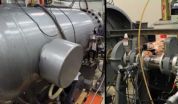(Press-News.org) Women who receive strong social support from their families during pregnancy appear to be protected from sharp increases in a particular stress hormone, making them less likely to develop postpartum depression, according to a new study published in Clinical Psychological Science, a journal of the Association for Psychological Science.
"Now we have some clue as to how support might 'get under the skin' in pregnancy, dampening down a mother's stress hormone, and thereby helping to reduce her risk for postpartum depression," said Jennifer Hahn-Holbrook, a UCLA National Institute of Mental Health postdoctoral scholar in psychology and fellow at UCLA's Institute of Society and Genetics, and lead author of the research.
The scientists recruited 210 pregnant women of different ethnicities and socioeconomic backgrounds, surveying them three times during pregnancy — at 19, 29, and 37 weeks — and eight weeks after giving birth. The women were asked in interviews about how much support they received from their families and from the father of the child, and about their symptoms of depression. In addition, blood samples from each participant were analyzed to assess levels of placental corticotropin-releasing hormone (pCRH), a stress hormone released from the placenta.
After taking factors such as age, education, and income into account, Hahn-Holbrook and her colleagues discovered that pregnant women who reported the greatest support from their families seemed to have relatively lower levels of depressive symptoms. They also had the least dramatic increases in pCRH and the lowest absolute levels of pCRH in the third trimester of pregnancy.
Additional analyses revealed that pCRH levels in the third trimester fully explained the relationship between family support in pregnancy and postpartum depression symptoms.
These results are consistent with the conclusion that social support protects against abnormal pCRH increases and that lower pCRH levels in turn reduce risk of postpartum depression.
"Our results, and those of other scientists, suggest that low or absent support is a significant risk factor for postpartum depression, and that strong support is a protective factor," Hahn-Holbrook said.
Previous research has found that levels of pCRH typically increase during the third trimester of pregnancy. Women who exhibit the most dramatic increases in pCRH seem to show the most severe postpartum depression. Research has also shown that social support can dampen biological stress responses in women who are not pregnant. In the new study, Hahn-Holbrook and colleagues integrated these two strands of research, examining the interplay between a psychological factor, social support, and a biological factor, pCRH, in predicting postpartum depression.
"We investigated perceived support — the extent to which a mother felt she could count on her family and the baby's father should she need them," said Chris Dunkel Schetter, UCLA professor of psychology and co-author of the study. Social support, she added, entails many things, including help with "tasks or material assistance," but also emotional support in the form of acceptance, listening and making someone feel cared for and valued.
"Emotional support seems to be the most powerful form of support that you can provide to someone, but it is difficult to do right," Dunkel Schetter said.
While pregnant women who felt strong support from their families and from the child's father had fewer depressive symptoms, there was no relationship between support from the father and levels of pCRH. Although father support was not as strong of a protective factor as family support in this study, "there is no doubt that fathers are a critical part of a healthy pregnancy," Hahn-Holbrook said. It could be that support from the father influences pCRH levels earlier in pregnancy, or father support may act by a different biological or behavioral pathway altogether, Hahn Holbrook said.
"Mothers with support from fathers may be more likely to practice healthy behaviors, which has been shown to contribute both to healthier babies, better birth outcomes, and lower postpartum disturbance," Dunkel Schetter added.
The study's results suggest that the timing of support interventions is especially important.
"Because levels of pCRH in the last trimester contributed to postpartum depression, early social support interventions might protect against both elevated pCRH and depressive symptoms," Dunkel Schetter said. "Too many interventions in the past have been mounted too late in pregnancy," she added.
More research should be conducted to determine when, what, and how to provide the optimal support to mothers during pregnancy, according to Dunkel Schetter. Her laboratory is conducting further research in this area.
Sharp increases in pCRH over the course of pregnancy are associated with preterm births, defined as births earlier than 37 weeks of gestation. It is possible that social support or other stress reduction methods provided early in pregnancy could provide health benefits, and ultimately for the baby as well.
"Even better, would be to support and educate women before pregnancy to maximize healthy pregnancies" Dunkel Schetter noted.
###
Co-authors of the research are Chander Arora and Calvin Hobel from Cedars-Sinai Medical Center. This research was federally funded by the National Institute of Child Health and Human Development (HD29553; HD28413), a part of the National Institutes of Health.
For more about Dunkel Schetter's research, visit http://health.psych.ucla.edu/CDS/index.php.
For more information about this study, please contact: Jennifer Hahn-Holbrook at jhahn@psych.ucla.edu.
Clinical Psychological Science is APS's newest journal. For a copy of the article "Placental Corticotropin-Releasing Hormone Mediates the Association Between Prenatal Social Support and Postpartum Depression" and access to other Clinical Psychological Science research findings, please contact Anna Mikulak at 202-293-9300 or amikulak@psychologicalscience.org.
END
New research from the University of Adelaide has discovered a high prevalence of vitamin B12 deficiency among refugees, prompting calls for refugees to be routinely screened for the problem soon after they arrive.
Vitamin B12 deficiency is a sign of severe malnourishment and can result in permanent damage to the nervous system. For women of child-bearing age, vitamin B12 deficiency can lead to developmental defects in their unborn children. If left untreated, the deficiency could be fatal.
In the first study of its kind in the world, researchers from the University ...
Dining on field grasses would be ruinous to human teeth, but mammals such as horses, rhinos and gazelles evolved long, strong teeth that are up to the task.
New research led by the University of Washington challenges the 140-year-old assumption that finding fossilized remains of prehistoric animals with such teeth meant the animals were living in grasslands and savannas. Instead it appears certain South American mammals evolved the teeth in response to the gritty dust and volcanic ash they encountered while feeding in an ancient tropical forest.
The new work was conducted ...
CAMBRIDGE, MA -- Bringing the concept of an "artificial leaf" closer to reality, a team of researchers at MIT has published a detailed analysis of all the factors that could limit the efficiency of such a system. The new analysis lays out a roadmap for a research program to improve the efficiency of these systems, and could quickly lead to the production of a practical, inexpensive and commercially viable prototype.
Such a system would use sunlight to produce a storable fuel, such as hydrogen, instead of electricity for immediate use. This fuel could then be used on demand ...
Human activities are not the primary cause of arsenic found in groundwater in Bangladesh.
Instead, a team of researchers from Lawrence Livermore National Laboratory, Barnard College, Columbia University, University of Dhaka, Desert Research Institute and University of Tennessee found that the arsenic in groundwater in the region is part of a natural process that predates any recent human interaction, such as intensive pumping.
The results appear in the March 4 edition of the Proceedings of the National Academy of Sciences.
Millions of people in Bangladesh and neighboring ...
(Boston) – Researchers at Boston University School of Medicine (BUSM) and VA Boston Healthcare System (VA BHS) have found that cognitive behavioral therapy (CBT) can help relieve pain for people with painful diabetic neuropathies. The study, which is the first of its kind to examine this treatment for people with type II diabetes mellitus, is published in the March issue of the Journal of Pain.
Type II diabetes mellitus is the most common form of the disease and affects more than 20 million Americans. The onset of type II diabetes mellitus is often gradual, occurring ...
CAMBRIDGE, MA -- Since the mid-1800s, doctors have used drugs to induce general anesthesia in patients undergoing surgery. Despite their widespread use, little is known about how these drugs create such a profound loss of consciousness.
In a new study that tracked brain activity in human volunteers over a two-hour period as they lost and regained consciousness, researchers from MIT and Massachusetts General Hospital (MGH) have identified distinctive brain patterns associated with different stages of general anesthesia. The findings shed light on how one commonly used ...
VIDEO:
NASA scientists at the Goddard Cosmic Ice Lab are studying a kind of chemistry almost never found on Earth. The extreme cold, hard vacuum, and high radiation environment of space...
Click here for more information.
Behind locked doors, in a lab built like a bomb shelter, Perry Gerakines makes something ordinary yet truly alien: ice. This isn't the ice of snowflakes or ice cubes. No, this ice needs such intense cold and low pressure to form that the right conditions ...
Back in 2010, the ideas behind a squid's sticky tendrils and Spiderman's super-strong webbing were combined to create a prototype for the first remote device able to stop vehicles in their tracks: the Safe, Quick, Undercarriage Immobilization Device (SQUID). At the push of a button, spiked arms shot out and entangled in a car's axles—bringing a racing vehicle to a screeching halt.*
The need to stop vehicles remotely was identified by the law enforcement community. With funding from Homeland Security's Science & Technology Directorate, and the expertise of the engineers ...
SEATTLE—Researchers used electronic health records to identify Group Health patients who weren't screened regularly for cancer of the colon and rectum—and to encourage them to be screened. This centralized, automated approach doubled these patients' rates of on-time screening—and saved health costs—over two years. The March 5 Annals of Internal Medicine published the randomized controlled trial.
"Screening for colorectal cancer can save lives, by finding cancer early—and even by detecting polyps before cancer starts," said study leader Beverly B. Green, MD, MPH. "But ...
Studied for decades for their essential role in making proteins within cells, several amino acids known as tRNA synthetases were recently found to have an unexpected – and critical – additional role in cancer metastasis in a study conducted collaboratively in the labs of Karen Lounsbury, Ph.D., University of Vermont professor of pharmacology, and Christopher Francklyn, Ph.D., UVM professor of biochemistry. The group determined that threonyl tRNA synthetase (TARS) leads a "double life," functioning as a critical factor regulating a pathway used by invasive cancers to induce ...



